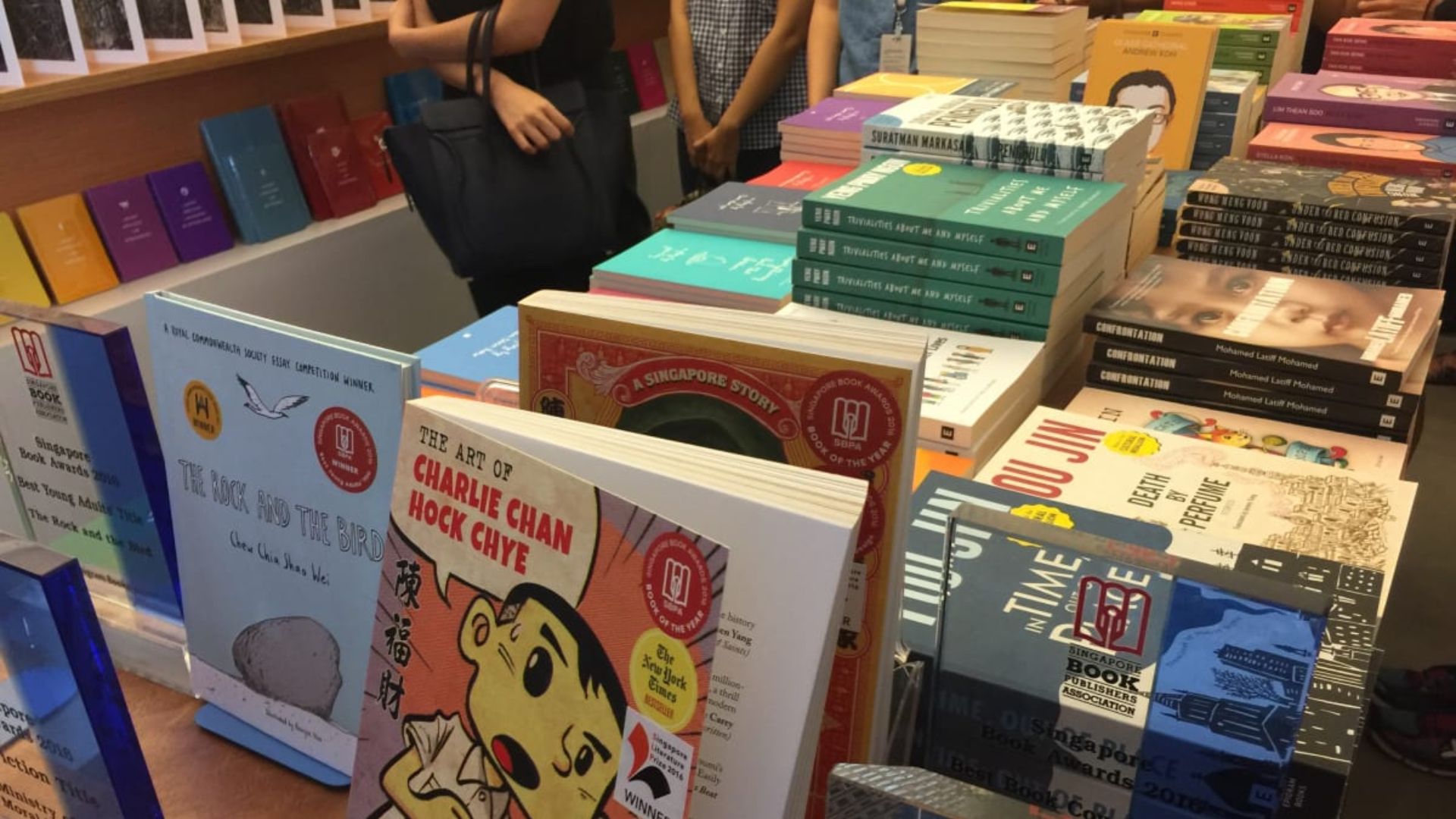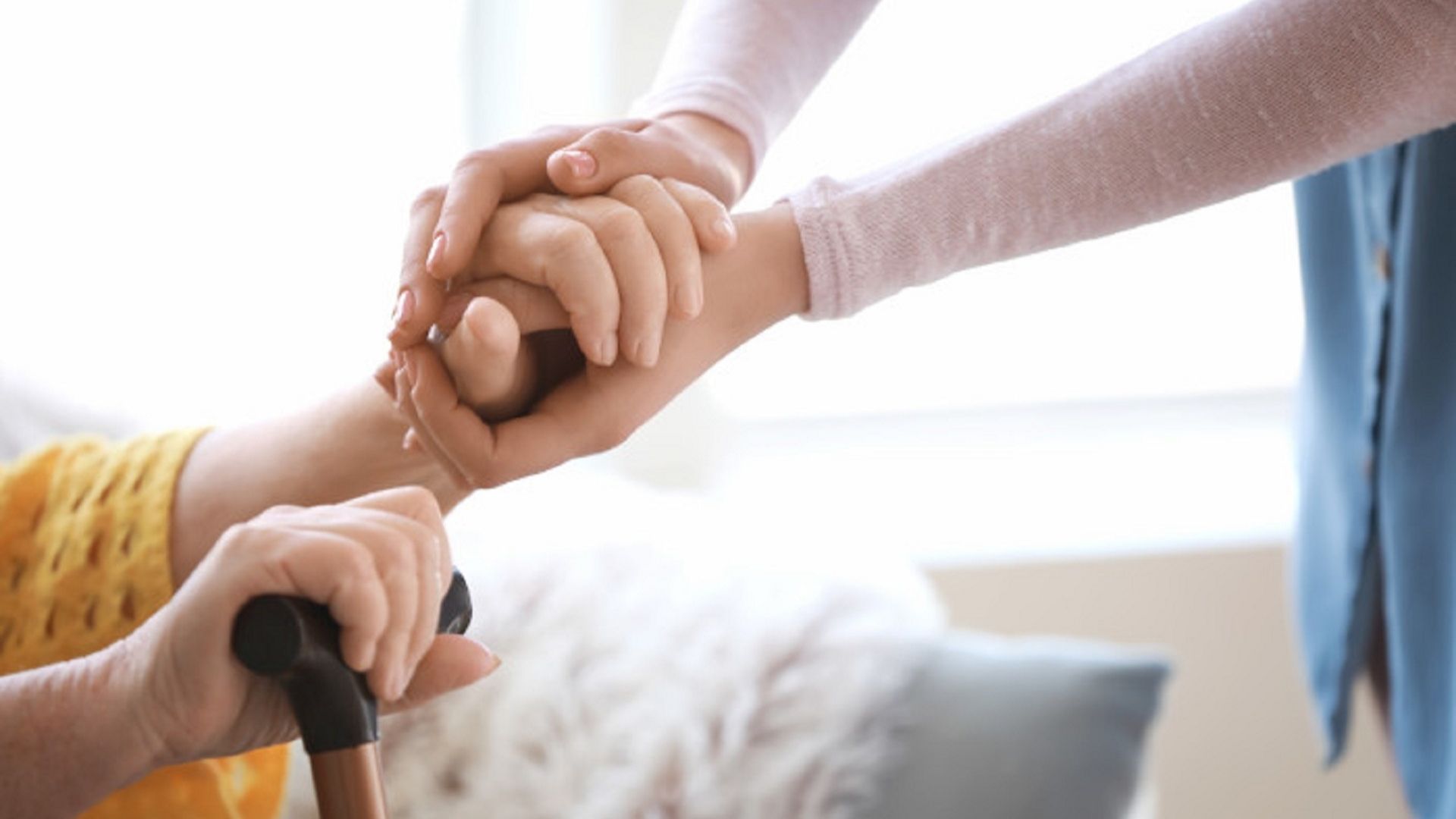Ms Adele Lau recounts how, as a teenager, the presence of animals helped her feel less anxious in social settings.
“As I grew into my teenage years, I realised that I was an introvert, and I found it uncomfortable to make small talk with unfamiliar people, but being in the presence of dogs has always made me feel less anxious,” she says.
After graduating from law school, Ms Lau went on to work closely with animals in agencies such as the National Parks Board (NParks) and the Agri-Food and Veterinary Authority of Singapore (AVA), before she left to found animal-assisted interactions sg (aaisg) in 2022.
Aaisg is a social enterprise that specialises in animal-assisted interactions and interventions (AAI). In a field that is growing in demand, the lack of best practices and standard guidelines, and the training for both handlers and animals is a gap that aaisg hopes to address to reduce the risk of public health, safety, and animal welfare.
“I went into AAI because of my love for animals, and because I see it has the potential to help so many in the community in a way that no other activity, therapy, or human can. I believe that many people in the community could benefit from AAI socially, physically, and emotionally. AAI can facilitate conversations between total strangers, motivate youths and seniors to participate in activities with their peers, and complement talk therapy to create a relationship of trust between a social worker, therapist or counsellor and his or her client,” she says.
In February 2022, canine companions from aaisg were sought by a vaccination centre at Nee Soon East CC to comfort children who were anxious about getting the Covid-19 jab. But do not be too quick to assume that the AAI field is just groups of people playing with dogs, Ms Lau says.
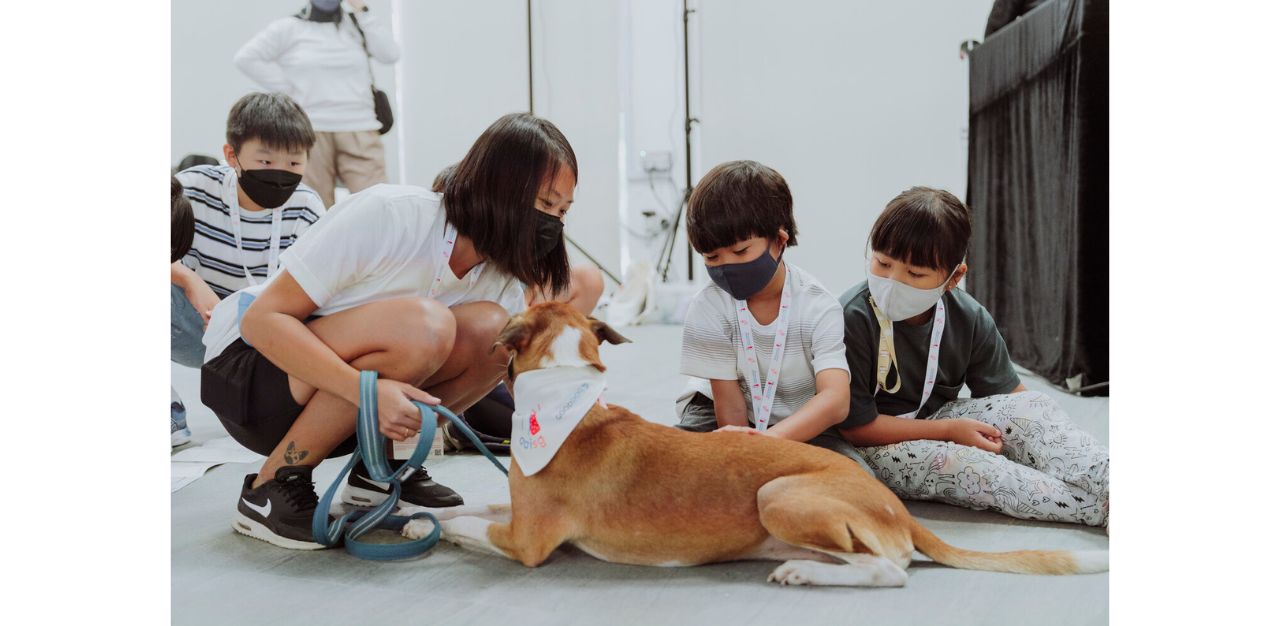
“Occasionally, people think that AAIs are just about ‘playing with dogs’ and are unconvinced that having a dog there can make a difference. But in our personal experiences, and based on existing research, dogs can bring a whole new dimension to the quality of our interactions with others,” says Ms Lau.
“Someone struggling with social anxiety might feel more willing to engage with a group of people when the activities are focused on the friendly and non-judgemental dog. The warmth of a dog’s body or the texture of their curly fur provides somatic input that can help someone healing from trauma develop increased awareness of their own bodily experiences.”
TheHomeGround Asia speaks to Adele Lau as she brings us through the growing field of AAI, her love for animals, and responsible pet ownership.
TheHomeGround Asia (THG): How and when did your love for animals begin?
Adele Lau (AL): I have always loved animals since I was a child! I used to bring home stray kittens and I don’t think my parents appreciated that. Whenever I followed my parents to their friends’ homes for meals, I would always hope that there would be a dog so that I could hang out with it instead. Some of my friendships today are a result of people approaching me because they wanted to meet my dog.
THG: Which animals are you most partial to and why?
AL: Definitely dogs! I feel that they tend to be more affiliative towards humans due to the way they were domesticated and selectively bred. Compared to other pets, dogs can also become an integral part of our daily lives when we bring them on walks to explore new trails or cafes, or even overseas with us.
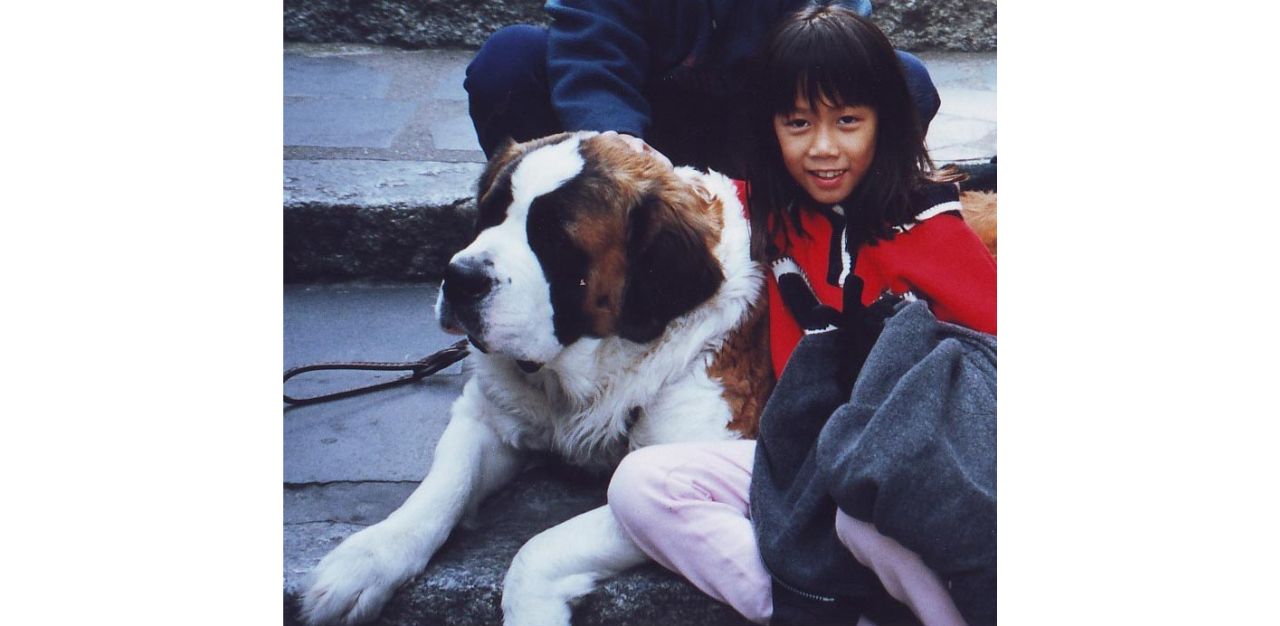
THG: You were trained in law yet you went into animal-assisted activities. Why?
AL: I always wanted to have a career that involved working with animals, and I was even supposed to attend veterinary school in Sydney. A few months before that my parents encouraged me to pursue a “safer” degree instead, and that’s how I ended up going to law school. I have no regrets about that since it has led me to where I am today. I have been pursuing my interest in AAI through certifications and qualifications since I was called to the Singapore Bar in 2016.
I also empathise with the struggles that teens today go through. I hope that our AAI programmes can help them by providing them with mindfulness, emotional regulation, self-confidence, and more. Having been a rebellious teen myself, I know that I would definitely have been more open to listening and trusting an adult if a dog were part of the relationship or conversation.
Working with our dogs can help individuals understand emotions, behaviours, and reactions by understanding canine behaviour and how dogs learn – dogs are not so different from us in that way.
THG: When and why did you start aaisg, and how did you go about doing it?
AL: I set up aaisg in February 2022 with my friend and director Stasha Wong, with the hope that aaisg will be the leader in this field, setting standards and best practices for AAI for the wellbeing of humans and animals at the centre of everything we do.
Over the years, I noticed an increasing number of individuals and organisations claiming to practise AAI in Singapore without having any relevant educational qualifications or experience. AAI is not as simple as adding a dog into an existing programme. Without the appropriate knowledge and skills in AAI, one can end up causing more harm than good to both the humans and animals involved.
In photos and videos of individuals claiming to do AAI, you can observe the dogs’ behaviours and see that they are stressed and not enjoying themselves. When dogs are repeatedly put in stressful situations by their owners, they may feel that they have no other option but to snap or bite to remove themselves from that. In severe cases, this could jeopardise the dog’s life, as well as the growing field of AAI.
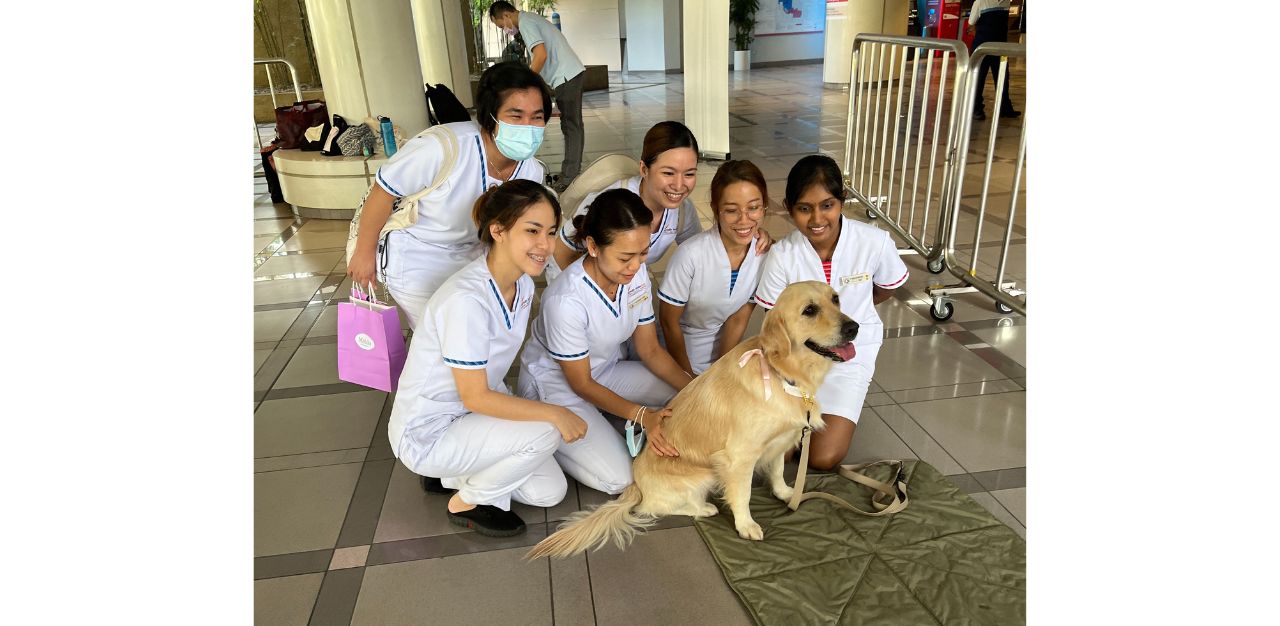
THG: You are careful not to label the animals as “therapy” animals to manage the expectations of clients. You also state that aaisg seeks to set guidelines as these are currently lacking. What are some key challenges that both you and aaisg faced or is facing in this industry?
AL: AAI is very new in Singapore compared to places like Australia and the United States, where it is common to see trained dogs as an integral part of patient care and education. In Spain, the hospital dogs were considered an essential service for patients and staff in hospitals during the pandemic.
The challenges that we face here include the lack of awareness of evidence-based benefits of AAI, and the use of incorrect terminology. There is also some hesitance to try out our programmes due to the fear of public backlash, religious sensitivities, and the perception that dogs are dirty and can spread diseases. We are working towards changing those perceptions of AAI in Singapore and we always offer our clients options to address the aforementioned concerns.
THG: Aaisg is in the process of developing guidelines. How is aaisg formulating these guidelines, and can you share some examples and how it will help the AAI industry?
AL: There are existing international guidelines on AAI. However, these guidelines were written based on the context and social norms of other countries and may not necessarily be relevant for Singapore.
The guidelines that we are currently developing are based on some of the best practices internationally, but are also modified to take into account the fact that AAI is still in its infancy in Singapore, that the animals we are allowed to keep here as pets differ from the animals that may be kept as pets in the US, as well as our social and cultural norms. We have also consulted local and international experts and practitioners to ensure that our guidelines are in line with international standards and viable for practice in reality.
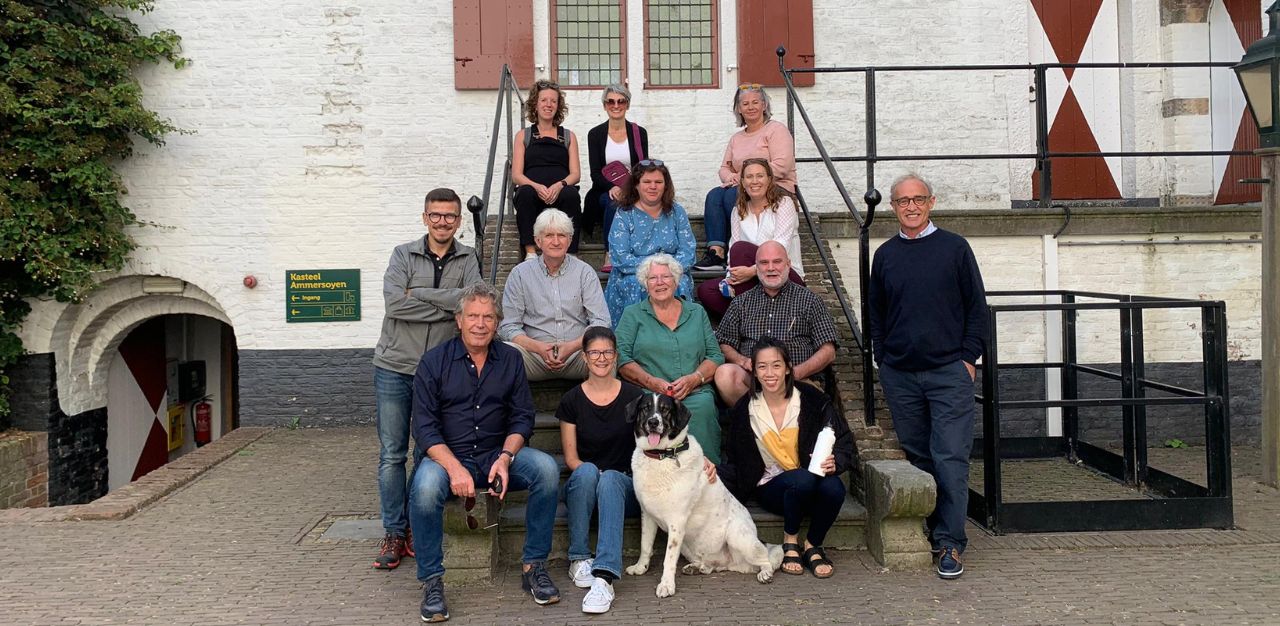
THG: You were enrolled in two specialist courses recently, a masters in advanced animal law and a professional certificate program for AAI professionals. What motivates you to keep learning and how do you juggle your different responsibilities?
AL: I joke with my family and friends that collecting qualifications and certifications is my hobby!
Because of my passion for AAI and animal-related law, I don’t find it difficult to be motivated to complete my courses. AAI is a field that is rapidly growing so I also believe that it is necessary for us at aaisg to be connected to the international community and to be up to date with the latest research.
Juggling my different responsibilities is only possible with my husband, family, and colleagues. My family is very supportive of my endeavours and they love animals too. My parents and husband have also learned a lot more about dog behaviour and training over the years. My husband and my mother have joined us for several aaisg visits when they are free. It is a nice and meaningful way to spend time together.
While I’m working on my masters or other certifications, I know that I can count on my team to keep our programmes running safely and effectively.
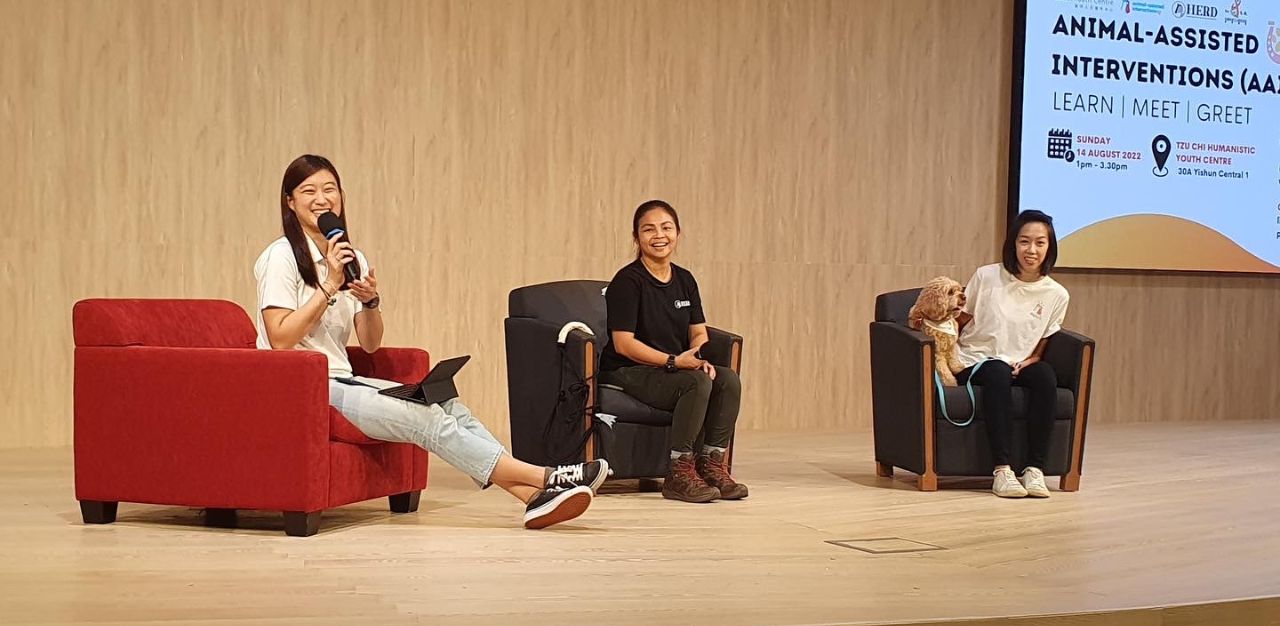
THG: There has been a recent spike in pet abandonment in Singapore, largely attributed to pet owners who are unable to care for the pets adopted during Covid-19 pandemic. As someone who is involved in animal welfare, what can be improved in the current framework to address irresponsible pet ownership?
AL: The abandonment of pets is a multifaceted issue. I think one of the root causes of pet abandonment is impulse purchases.
To address the issue of the impulse purchasing of pets, I think that there needs to be lived experience of what it takes to care for an animal, and an informed view of where the animal you’re buying comes from and what type of industry you’re supporting.
On the topic of responsible pet ownership, I’m personally sceptical about how much education on this can do to deter people from buying pets on impulse and abandoning them later. There is no evidence to show how effective responsible pet ownership campaigns have been over the years. It has come to a point where the typical information about how long a pet lives, how much it costs to keep a pet, and how they too are sentient, just flies over people’s heads. If a person wants a pet badly enough, they are likely to ignore the objective information before them and go ahead and buy one anyway.
On my second point about poorly bred animals, pets that are bred well are less likely to have health and behavioural issues. Well-bred pets such as dogs and cats tend to come from overseas where breeders breed and raise the offspring in a home environment instead of being confined in cages, are selective about mating, taking into account genetic predispositions to reduce the likelihood of the offspring inheriting potential issues, provide them with appropriate and gradual socialisation. As you can see, ethical breeding takes a lot of time and effort, and it is not uncommon for one to have to wait for months to a year to get a puppy.
Many people do not want to wait for a well-bred dog, and turn to impulse buying from pet shops and pet farms which churn out new puppies from inhumane conditions and over-breeding the female dogs. Dogs bred in poor health and welfare conditions are likely to grow up with behavioural issues which, in turn, can be very stressful for an inexperienced owner who does not have the right information and support. Studies have shown that behavioural issues are the top reasons for animals being relinquished and abandoned.
I have two suggestions on how we can address one of the root causes of abandonment. Firstly, encourage individuals who are keen to bring a pet into their home to have a lived experience of owning a pet. This could be through aaisg’s programmes, or even helping a friend take care of his dog for a few days while he is away.
Secondly, similar to other countries such as Britain, it should be mandatory for the pet farms and pet shops to be transparent about how the animals are kept and bred. This could be easily implemented by replacing the wall segregating the shop front and the breeding area with glass, allowing people to see the conditions in which the animals are being kept.
Breeders may reject this suggestion, claiming that customers could bring in infectious diseases to the animals, but this could be easily addressed by disinfecting one’s shoes, or just looking through the glass. If people could see the conditions in which these animals are currently being kept and bred, I think they can no longer turn a blind eye to unethical pet breeding.
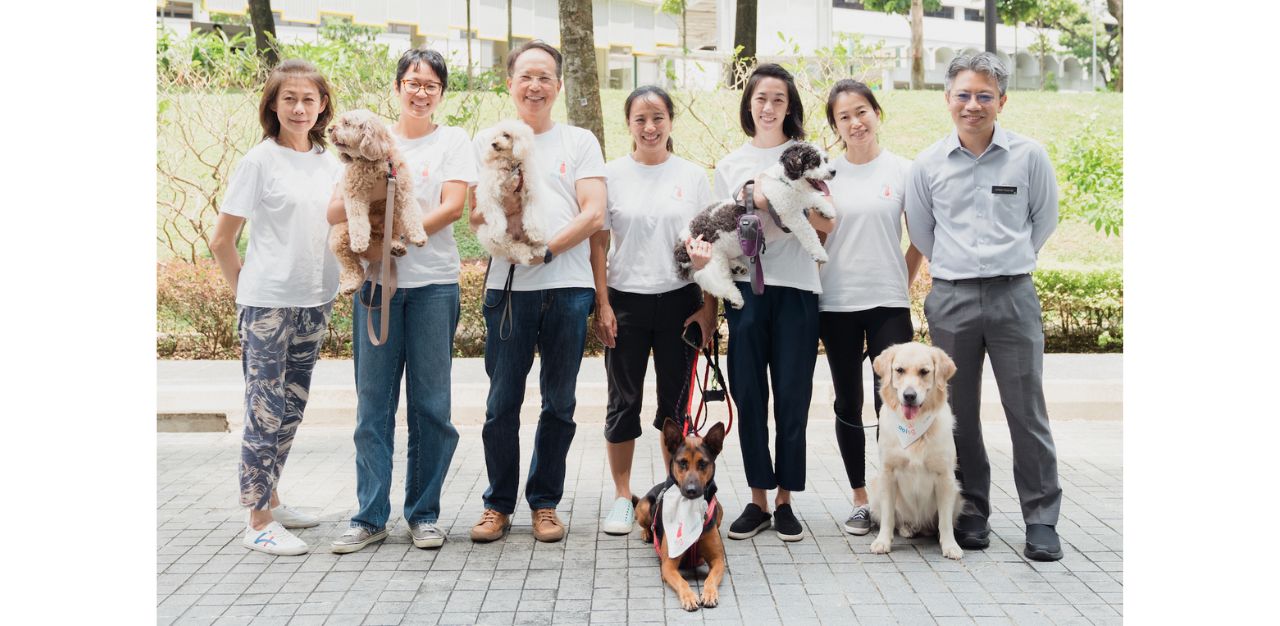
THG: Part of aaisg’s mission is “working and growing towards better, healthier communities, together”. What does that look like to you?
AL: We try to build life-giving relationships between dogs and people within and beyond aaisg. We do this in several ways. We look to help improve the relationship between our aaisg members and their dogs by equipping them with information and skills on advocating for their dog, recognising stress signals, reading dog behaviour, and how to enhance their dog’s wellbeing. We hope that they are then able to pass this on to other dog owners whom they meet.
Concurrently, we work with our Caring Canine teams, which consists of the dog and his or her handler, to facilitate meaningful interactions with our clients by making heartfelt connections, sparking uplifting conversations, which in turn can help to improve our clients’ moods. With improved moods and outlooks, our clients are then in a better place to build rapport and feel more trusting with their caregivers, parents, social workers, and therapists.
RELATED: The healing power of animal-assisted activities: When the dogtors make house calls
Join the conversations on TheHomeGround Asia’s Facebook and Instagram, and get the latest updates via Telegram.






















